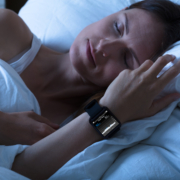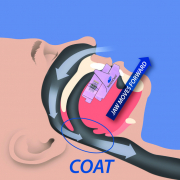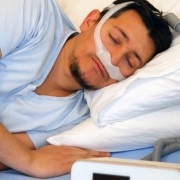Breast Cancer and Sleep Apnea
Breast Cancer and Obstructive Sleep Apnea
In a recent study, the incidence of breast cancer among patients with Obstructive Sleep Apnea was significantly higher than that of the control group. In particular, the incidence of breast cancer was higher among patients aged ≥65 years. The result suggests that OSA may be a risk factor for breast cancer in women.
Recent studies have shown that disturbed sleep and low blood oxygen levels during the night, which are common in obstructive sleep apnea, may play an important role in the biology of different types of cancers.
In people with the OSA, the airway closes completely or partially many times during sleep, reducing the levels of oxygen in the blood. Common symptoms are snoring, chocking or gasping for air, disrupted sleep and excessive daytime tiredness.
The study found that people who have more airway closures during sleep and whose blood oxygen saturation levels fall below 90%, are diagnosed with cancer more often than people without sleep apnea.
The researchers also found that cancer was more common among women than men.
The most common type of cancer among women was breast cancer, while prostate cancer was the most prevalent among men. While the study can’t prove that sleep disorders cause cancer, it does show that there’s an association between the two.
Women are under-diagnosed for sleep apnea at a rate of 6-to-1
So why are women so under diagnosed?
Some of the reason’s women aren’t diagnosed with sleep apnea may be:
- Many women talk with their general practitioners about their sleep problems rather than a sleep specialist. Some these doctors have preconceived notions about what a typical sleep apnea patient looks like and may overlook the reported symptoms by women when they don’t fit the common portrait.
- Women maybe be embarrassed and less likely to report loud, chronic snoring.
- Women usually report different symptoms than men which may lead to a misdiagnosis.
- Common symptoms of OSA seen in women-
- Fatigue
- Insomnia
- Headaches
- Mood disturbances
- Lack of energy
- Restless leg syndrome
- Depression
- Women are more likely to be prescribed prescription medications (such as anti-depressants) rather than be sent for a sleep study.
- Men may be less likely to be observant to their bed-partner’s sleep disturbances than women are. Many men who seek treatment for OSA only do so because of concern by their bedpartner.
Getting a quality night’s sleep is more important than you may have realized. The American Academy of Sleep Medicine recommends 7 or more hours of quality sleep a night. If you or your bedpartner are having any issues with sleeping or daytime sleepiness, make an appointment with our sleep medicine professions to get evaluated today. We are offering Televisits for new and returning patients. Give us a call and Say Hello to Sleep Again.











